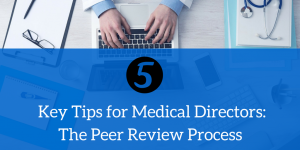| CLICK HERE for our white paper on the leveraging the value of Physician Advisors and Peer Reviews for organizational improvements. |
 Whatever the title, Medical Director, CMO, or similar, the responsibilities loom large with little relief in sight. Burnout, recruitment, and retention might be a larger concern than medical necessity criteria, case shaping, and utilization management. The end of the ACA won’t likely make things easier. With that in mind, here are 5 time-saving tips for medical directors.
Whatever the title, Medical Director, CMO, or similar, the responsibilities loom large with little relief in sight. Burnout, recruitment, and retention might be a larger concern than medical necessity criteria, case shaping, and utilization management. The end of the ACA won’t likely make things easier. With that in mind, here are 5 time-saving tips for medical directors.
“Medical directors have been an integral part of the birth and growth of the physician advisor profession and its training programs. They are an industrious, skilled, and dedicated group of individuals who enthusiastically support PAs and their niche in the health care world. They deeply want to see the profession continue to grow and thrive in a dynamic era. It is essential that they themselves grow beyond their current roles if they are to continue to hold their valuable place in the journey onward.” – John Houchins, MD
These words, spoken by John Houchins, couldn’t ring more true today as Medical Directors continue to shape, transform, and drive improvements throughout the areas of peer review programs and via the provision of physician advisor services. Here are 5 key tips for Medical Directors on creating a Peer Review Program which increases efficiency, optimizes internal processes, and creates an atmosphere of meaningful quality improvement within an organization.
- Medical Necessity Criteria: Make sure that everyone on your team has a deep knowledge of Medical Necessity Criteria and Clinical Rationale, particularly on how they vary.
Estimates as high as 60% of your rework comes from misapplied MNC!
Gaining a comprehensive understanding of Medical Necessity Criteria is the foundation of an effective Peer Review Program and ensures quality. Click HERE for our popular Blog: 4 Medical Necessity Criteria Challenges and download our white paper.[email-download download_id=”7229″ contact_form_id=”68021″]
- Foster effective communication throughout your organization and within your Peer Review Program. One of the most common complaints when it comes to the Peer to Peer process is the lack of diplomacy from the reviewer when speaking to other physicians. Put in place communication best practices and train your team on how to diplomatically approach communication to foster great relationships and improve satisfaction.
- Understand the Legal and Regulatory Aspects of the Peer Review/Physician Advisor process. Whether the goal is to mitigate risk, improve compliance, or ensure optimal service – staying on top of legal and regulatory changes is key for any effective program. Does your review services contractor offer delegation? Using a contractor for delegation spreads the risk and shows the contractor stands by the determinations.
- Master the Art of Clinical Documentation. Documentation errors are one of the most common areas of dispute in relation to medical claims. They can also negatively impact an organization when it comes to meeting relevant turn-around times, and have the potential to increase denial rates. Identify clear objectives for clinical documentation, and put safe guards in place throughout your process to ensure that not only is every key data point captured, but that documentation is occurring in both a meaningful and compliant way.
- Manage your program through data – trying to manage without data is like trying to get to a new destination without any kind of map.
If you can’t instantly analyze case data detail by:
- Concordance rates
- Level of Care
- Review types
- Case manager submissions
- Reviewers utilized
Then your metrics are under-powered.
Concordance rates, Inter Rater Reliability, Turn around times, and review submissions are great numbers to start with. Ensure that you are pulling data in a consistent way, and reporting on this weekly or monthly to identify negative trends, and highlight areas for improvement.
Independent review services improve workflow and lower staffing expenses. CLICK HERE for our white paper on the leveraging the value of Physician Advisors and Peer Reviews for organizational improvements.





